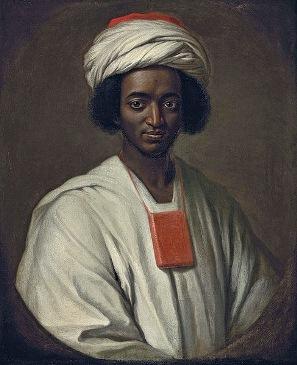Which Slave Wrote His Way Out of Slavery?
Share
Explore Our Galleries
Breaking News!
Today's news and culture by Black and other reporters in the Black and mainstream media.
Ways to Support ABHM?
By Henry Louis Gates, Jr., The Root
This African penned a letter powerful enough to lead to freedom.
From the time when they first landed in Florida in the early 1500s, African Americans did their best to run away from the inhumane conditions of slavery. Over the course of slavery in the United States between 1513 and 1865, tens of thousands of people

Qatar Museums Authority/Orientalist Museum, Doha, Qata
managed to escape, first south from the Carolinas and Georgia to the haven afforded by Spanish Florida before 1763, and later,north from the Southern colonies and states across the Mason-Dixon Line. More than a hundred of these “fugitive slaves,” as they were called, even wrote or dictated books about their deliverance from bondage, detailing how they were able to escape. While each escape was something of a miracle, some of the methods that they used are astonishing.
Everyone has their favorite slave narratives, as the genre of books is called. My own short list includes the stories of Henry Brown, William and Ellen Craft and Frederick Douglass. In 1838 Frederick Douglass donned a sailor’s uniform, sewn by his soon-to-be wife, who was free, and rode a train from Baltimore to Philadelphia disguised as a free man using papers he had obtained from a free black seaman. In 1848 Ellen Craft, who had a very light complexion, did a double cross-dress as white man and, accompanied by her dark-complexioned husband, rode to freedom on a train ride from Macon, Ga., to Philadelphia, masked as master and slave. A year later Henry “Box” Brown actually had himself nailed into a wooden, claustrophobic, coffin-like box, and then shipped from slavery in Richmond to freedom in Philadelphia.
But the oddest way that a slave escaped from slavery, to me, without a doubt, is the story of Ayuba.
Ayuba wrote his way out of slavery. As incredible as this may seem, this is literally true. The man who came to be known in England as “Job ben Solomon” was born Ayuba Suleiman Jallo (or, in French, “Diallo”) into a prominent family in Bundu, an independent, precolonial country located in current-day Senegal….
Find out how Ayuba did it – and how he was involved in the slave trade – here.
Read Breaking News here.











Comments Are Welcome
Note: We moderate submissions in order to create a space for meaningful dialogue, a space where museum visitors – adults and youth –– can exchange informed, thoughtful, and relevant comments that add value to our exhibits.
Racial slurs, personal attacks, obscenity, profanity, and SHOUTING do not meet the above standard. Such comments are posted in the exhibit Hateful Speech. Commercial promotions, impersonations, and incoherent comments likewise fail to meet our goals, so will not be posted. Submissions longer than 120 words will be shortened.
See our full Comments Policy here.